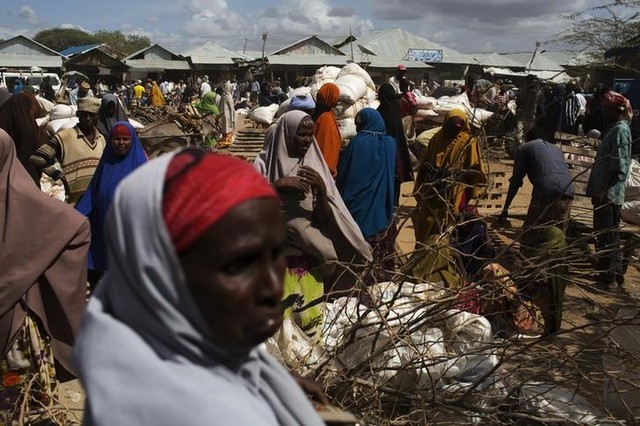Fears for refugees health in Kenya as food aid rations halved


By Reuters
Food rations to more than 400,000 refugees in Kenya have been halved due to severe funding shortages, and existing supplies will run out completely at the end of February, the United Nations said on Tuesday.
Kenya hosts 434,000 refugees from 21 countries, mainly from war-torn neighbouring South Sudan and Somalia, in two overcrowded camps on its northern borders.
“We are very worried about the impact of this on the refugees,” Challiss McDonough, a spokeswoman for the World Food Programme (WFP), told the Thomson Reuters Foundation.
“There is a chance, particularly if (the food ration cuts) go on for a long time, of health consequences, of deterioration in people’s nutritional status.”
People may also start skipping meals and go into debt by borrowing money to eat, she said.
Many of the refugees are women and children, including children living alone who fled without family members, she said.
Refugees in Kenya are supposed to receive two-thirds of the 2,100 calories they need each day in monthly rations of cereals, pulses, oil and flour and one-third in cash.
Mobile money transfers of $2 to $5 per person per month allow them to buy fresh food from nearby markets, while also supporting the local economy in Kenya’s impoverished, arid north.
Monthly food rations were halved at the start of December to eke out supplies and cash transfers will run out at the end of January, WFP said.
“It really is just the bare necessities that we are trying to provide and we haven’t been able to do that for some time,” said McDonough.
In Dadaab camp, 85 percent of refugees have been receiving 70 percent of their food rations since June 2015. Now a deeper cut has been introduced and extended to all refugees in Kenya.
Kenya is planning to shut down Dadaab, on its border with Somalia, which it sees as a security risk.
Rights groups have said the government is forcibly sending Somali refugees back into a war zone, charges it denies.
“The U.N. Food Programme’s decision to further reduce refugee food rations could not have come at a worse time,” Human Rights Watch researcher Gerry Simpson said in an email.
“Somali refugees in Kenya are being squeezed from all sides.”
The United States is shipping $22 million of food aid to Kenya but it will not be available for distribution until May, WFP said.